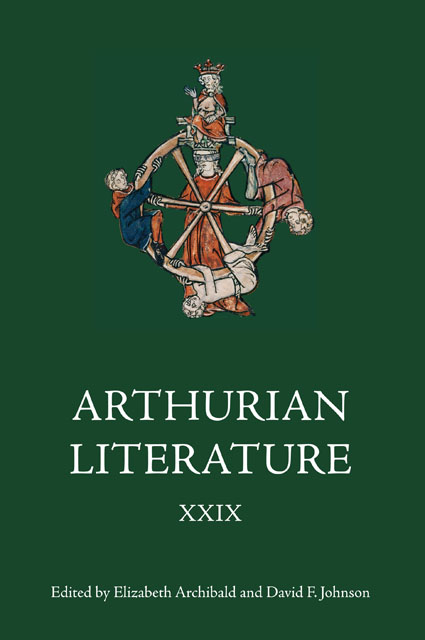Book contents
- Frontmatter
- Contents
- List of Illustrations
- General Editors’ Foreword
- List of Contributors
- I Edward III’s Abandoned Order of the Round Table
- II King Arthur’s Tomb at Glastonbury: The Relocation of 1368 in Context
- III Benedict of Gloucester’s Vita Sancti Dubricii: An Edition and Translation
- IV New Evidence for an Interest in Arthurian Literature in the Dutch Low Countries in the Fifteenth and Early Sixteenth Centuries
- V Malory’s Source-Manuscript for the First Tale of Le Morte Darthur
- VI Malory’s Sources – and Arthur’s Sisters – Revisited
- VII Peace, Justice and Retinue-Building in Malory’s ‘The Tale of Sir Gareth of Orkney’
- VIII Mapping Malory’s Morte: The (Physical) Place and (Narrative) Space of Cornwall
- IX The Fringes of Arthurian Fiction
- Contents of Previous Volumes
General Editors’ Foreword
Published online by Cambridge University Press: 14 February 2023
- Frontmatter
- Contents
- List of Illustrations
- General Editors’ Foreword
- List of Contributors
- I Edward III’s Abandoned Order of the Round Table
- II King Arthur’s Tomb at Glastonbury: The Relocation of 1368 in Context
- III Benedict of Gloucester’s Vita Sancti Dubricii: An Edition and Translation
- IV New Evidence for an Interest in Arthurian Literature in the Dutch Low Countries in the Fifteenth and Early Sixteenth Centuries
- V Malory’s Source-Manuscript for the First Tale of Le Morte Darthur
- VI Malory’s Sources – and Arthur’s Sisters – Revisited
- VII Peace, Justice and Retinue-Building in Malory’s ‘The Tale of Sir Gareth of Orkney’
- VIII Mapping Malory’s Morte: The (Physical) Place and (Narrative) Space of Cornwall
- IX The Fringes of Arthurian Fiction
- Contents of Previous Volumes
Summary
The contents of Volume 29 of Arthurian Literature range from a mid-twelfth century Latin vita of the Welsh saint Dyfrig to the early modern Arthur of the Dutch, from Edward III’s waning interest in the Order of the Round Table to the central thematic importance of Cornwall to Malory’s Morte Darthur, and also across much of Europe.
In the first essay Christopher Berard contends that Edward III’s experience of war during the Crécy campaign changed him from an enthusiastic supporter of the idealized, Arthurian code of knighthood to a proponent of ‘total’ warfare. By contrasting the ways in which the French and English kings employed Arthurianism for their respective causes, Berard sheds light on the literary ideal of chivalry as a social force in the age of Edward III. Julian Luxford looks at the circumstances surrounding the final translation, in 1368, of the tomb created for the remains of Arthur and Guenevere within Glastonbury Abbey. The relocation of this tomb to a place of extreme prominence and honour – before the high altar – reveals the strong interest in Arthur held by Glastonbury’s abbot, Walter of Monington, at the time. Luxford gives the text and translation of the document describing the relocation of 1368 (Oxford, Bodleian Library, Ashmole 826), and argues that it is important testimony to a previously unsuspected deep interest in this major historical tradition. Joshua Byron Smith provides a full-function edition and translation of Benedict of Gloucester’s Latin life of Saint Dyfrig, a figure who Smith argues is portrayed as ‘an exceptional ecclesiastic and miracle-worker, but also as King Arthur’s main spiritual support’. Writing at a time when interest in things Arthurian was on the rise, Benedict re-writes Arthurian history to make Dyfrig’s piety and prayers an essential key to Arthur’s success. Like Luxford, Sjoerd Levelt also demonstrates the persistence of an interest in King Arthur where previous scholarship had assumed it was lacking. There has been a scholarly consensus for many years now that production of new Middle Dutch Arthurian literature came to a complete halt in the fifteenth century. Levelt argues convincingly that this apparent lack of interest is deceptive, and offers new evidence, however ‘sketchy and haphazard’, for the persistence of Arthuriana in the Low Countries in the early sixteenth century, especially in historiographical materials.
Four essays focus on Malory. P. J. C.
- Type
- Chapter
- Information
- Arthurian Literature XXIX , pp. vii - viiiPublisher: Boydell & BrewerPrint publication year: 2012



